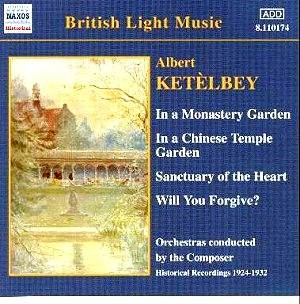Albert KETÈLBEY
In A Monastery Garden. In a Chinese Garden. Sanctuary of the
Heart. Will You Forgive me? Chad Romano - A Gypsy Overture. By
the Blue Hawaiian Waters. The Phantom Melody. In the Moonlight.
The Clock and the Dresden Figures. Sanctuary of the Heart etc
. Orchestras
and artists conducted by the composer. Historic recordings 1924-1932.
Orchestras
and artists conducted by the composer. Historic recordings 1924-1932.
 NAXOS 8.110174
[59:02]
NAXOS 8.110174
[59:02]

Here is some of the first original film music,
written for accompanying action the silent screen. It is unashamedly
unrestrained and sentimental and melodramatic. Albert Ketèlbey
acknowledged a growing need for mood music to accompany the flickering
images and he responded by writing accessible atmospheric and
dramatic mood music that was within the grasp of the average cinema
pianists. Such pieces like the colourful In a Chinese
Temple Garden, the exciting rhythms and the storm-clouded
By Blue Hawaiian Waters (still, to the best of my
knowledge not available on a modern recording) and the romantic
gypsy melodramatics of Chal Romano must have thrilled our
great-grandparents.
These historic recordings dating from 1924 to
1932 have great charm. The performances have that exciting bravura
and portmanteau expressions complete with those sentimental slurs
we associate with that period - take the romantic and sweetly
sentimental In the Moonlight for instance. The great Australian
bass/baritone, Peter Dawson sings Ketèlbey's most famous
composition, In a Monastery Garden, and that other famous
"heart-string-puller," Sanctuary of the Heart,
is given the full OTT treatment by the composer's concert orchestra
conducted by Ketèlbey and an unknown, unbilled contralto
displaying all the full-blown mannerisms of the period. Another
tear-jerker ballad is the OTT melodramatic Will You Forgive?
with warbling tenor Arthur Jordan in terribly contrite mood. Albert
Sandler (of Palm Court Orchestra fame) plays Ketèlbey's
first big hit, The Phantom Melody with the composer at
the piano. One of the most charming pieces features is The Clock
and the Dresden Figures with its enchanting melody and clock-like
figures. Two other pieces that are relatively unknown today are:
the evocative Three Fanciful Sketches ("A Passing
Storm Cloud on a Summer's Day"; "The Ploughman Homeward
Plods His Weary Way"; and "Quips and Cranks and Wanton
Wiles".)
Lots of period charm and a good wallow perfectly
attuned to the world of the silents.
Ian Lace

